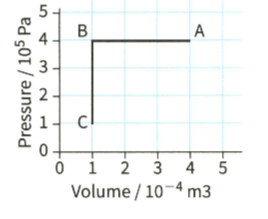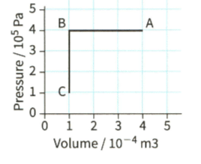The so-called 'zeroth law of thermodynamics' states that if the temperature of body is equal to the temperature of body and
the temperature of body is the same as body , then the temperature of body equals the temperature of body
Explain, in terms of energy flow, why the concept of temperature would be meaningless if this law was not obeyed.
Explain, in terms of energy flow, why the concept of temperature would be meaningless if this law was not obeyed.

Important Questions on Thermal Physics
. Figure shows a fixed mass of gas that undergoes a change from to and then to
During the change from toof thermal energy (heat) is removed from the gas. Calculate the change in the internal energy of the gas.
Figure shows a fixed mass of gas that undergoes a change from to and then to
During the change from to C, the internal energy of the gas decreases by . Using the first law of thermodynamics explain how this change can occur.
When a thermocouple has one junction in melting ice and the other junction in boiling water it produces an e.m.f. of .
What e.m.f. would be produced if the second junction was also placed in melting ice?
When a thermocouple has one junction in melting ice and the other junction in boiling water it produces an e.m.f. of .
When the second junction is placed in a cup of coffee, the e.m.f. produced is . Calculate the temperature of the coffee.
When a thermocouple has one junction in melting ice and the other junction in boiling water it produces an e.m.f. of .
The second junction is now placed in a beaker of melting lead at .
Calculate the e.m.f. that would be produced.
When a thermocouple has one junction in melting ice and the other junction in boiling water it produces an e.m.f. of .
The second junction is now placed in a beaker of melting lead at .
State the assumption that you make.
The resistance of a thermistor at is . At the resistance falls to . When the thermistor is placed in water of constant temperature, its resistance is.
Assuming that the resistance of the thermistor varies linearly with temperature, calculate the temperature of the water.


